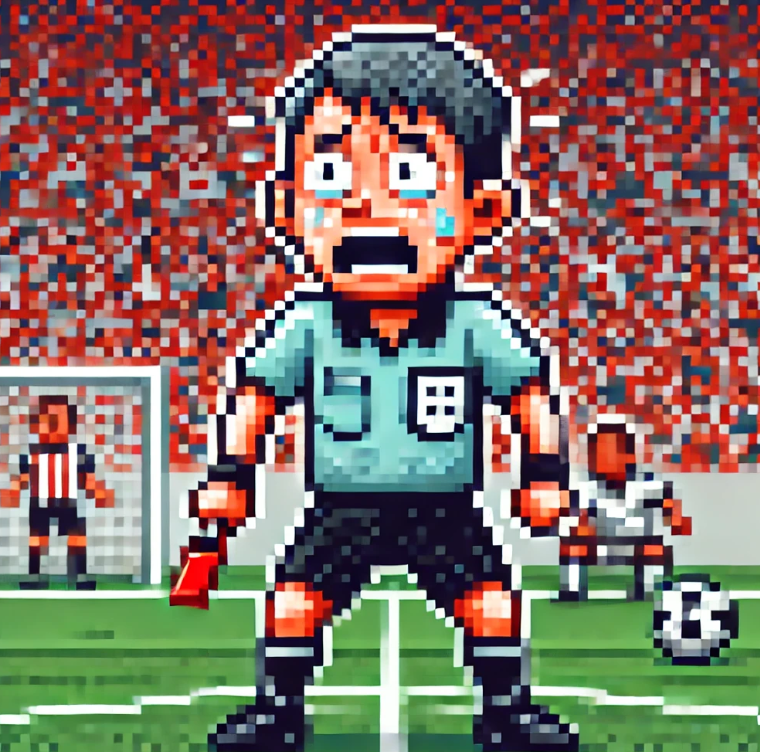
How Anxiety Impacts Soccer Referees Under Pressure
When I eventually transition out of my current role as Intramural Coordinator at the club I’ve worked at, I often considered being a referee.
Then I think to myself, “Why?”
What a thankless job. And that’s just for the little kids!
Refereeing a soccer match can feel like walking a tightrope. With thousands of eyes watching, one small mistake could change the outcome of the game. Fans, players, and coaches might shout from the sidelines, but inside a referee’s mind, something even more complex is happening. How does anxiety affect their decision-making? And can pressure actually help them perform better? These are the questions a new study explored, revealing surprising insights into how referees handle the intense demands of the game.
The Invisible Burden on Soccer Referees
Imagine standing on the field during a high-stakes soccer match. The clock is ticking, and you’re the referee. A player crashes to the ground, the crowd erupts, and both teams look at you. Is it a foul? Should you give a penalty? This split-second decision holds immense weight, not only for the players but also for your reputation as a referee.
Research has long shown that anxiety can cloud judgment, making it harder to focus and process information. Referees, who are constantly under scrutiny, face this challenge every game. While most people think pressure makes things worse, this study dives deeper, showing that the right kind of pressure might actually help referees perform better—even if they’re anxious.
Anxiety in the Spotlight
Anxiety is no stranger to soccer referees. In fact, it’s common for anyone in high-pressure situations. For referees, this anxiety can be triggered by the fear of making the wrong call, criticism from fans, or the general stress of a fast-paced game. According to the study, referees with high anxiety levels often experience more intense brain activity when making decisions. This shows up in larger spikes in certain brain signals (P300 and N400) when they’re not under pressure, suggesting that their brains are working overtime to process what’s happening on the field.
But what happens when pressure is added to the mix? Does it make things worse for anxious referees, or could it sharpen their focus?
The Role of Pressure: Friend or Foe?
Here’s where the study gets interesting. Researchers wanted to see how anxiety affects referees’ decision-making in two different environments: low-pressure and high-pressure. To simulate these conditions, they showed referees videos of soccer fouls, some with the added noise and stress of a real crowd. The referees were then asked to make penalty calls while their brain activity was measured.
What they found was surprising. Under low-pressure conditions (without the crowd noise), referees with high anxiety struggled more, showing greater brain activity than their low-anxiety counterparts. Their decisions took more mental effort, suggesting that anxiety was draining their cognitive resources.
However, under high-pressure conditions (with crowd noise), the difference between anxious and non-anxious referees disappeared. The brain activity of both groups leveled out. This indicates that the crowd pressure helped anxious referees focus better and make quicker decisions.
Why Does Pressure Help?
This finding might seem counterintuitive, but it aligns with the well-known “Yerkes-Dodson Law.” This principle suggests that while too much pressure can be harmful, a moderate amount of pressure can actually improve performance. Think of it like the difference between a sprinter at the starting line and someone casually jogging through a park. That starting-line pressure—the energy of the crowd, the tension of the moment—can push the sprinter to run faster and with more focus.
For referees, this pressure likely triggers their fight-or-flight response, releasing adrenaline and other stress hormones that heighten their concentration. When handled well, this boost in focus can help them overcome the distractions that anxiety often brings.
Real-World Implications for Soccer Coaches and Referees
So, what does this mean for the soccer world? First, it highlights the need to better understand how psychological factors, like anxiety, affect referees during games. This study shows that while anxiety might impair decision-making in low-pressure situations, the right amount of pressure can help referees push through these challenges.
This insight is crucial for coaches, players, and even fans. By recognizing the mental load that referees carry, the soccer community can find ways to support their mental health. After all, a clear-headed referee makes better decisions, leading to fairer outcomes in the game.
Applications
Here’s how this research can be applied in the real world:
1. Coaching: Coaches can help their players understand that referees are also human. Educating players on how anxiety and pressure affect decision-making might reduce on-field tensions and foster more respectful interactions with referees. By reducing the stress referees face from aggressive complaints or confrontations, coaches can create a better match environment.
2. Referee Training: Referee training programs should incorporate mental health support and strategies for handling anxiety. Techniques like mindfulness, breathing exercises, and visualization could help referees manage anxiety during games. These practices could prepare referees to better handle the pressures they face during high-stakes moments.
3. Club Management: Clubs and leagues can work on reducing the external pressures on referees by promoting respectful fan behavior. Campaigns that focus on lowering crowd hostility could ease the overall stress referees experience, allowing them to focus more on the game and less on their anxiety.
Conclusion: Referees Deserve Support Too
In the end, soccer referees carry an invisible burden. They face the challenge of making split-second decisions that can determine the outcome of a game, all while managing their anxiety and the external pressures of the crowd. This study reveals that while anxiety may cloud their judgment in low-pressure situations, the adrenaline boost from the right amount of pressure can help them focus and make better decisions.
As soccer continues to grow globally, the mental well-being of referees deserves just as much attention as that of players. By recognizing the mental demands placed on referees and providing the necessary support, we can ensure that the beautiful game remains fair and enjoyable for everyone involved.
Are you ready to delve deeper into the science and strategy of soccer?
This Week in Soccer offers you a unique blend of expert analysis, engaging infographics, and practical insights. Subscribe to our newsletter and stay ahead of the game with the latest in soccer analytics and coaching strategies. Make the move from spectator to strategist. Subscribe now!



